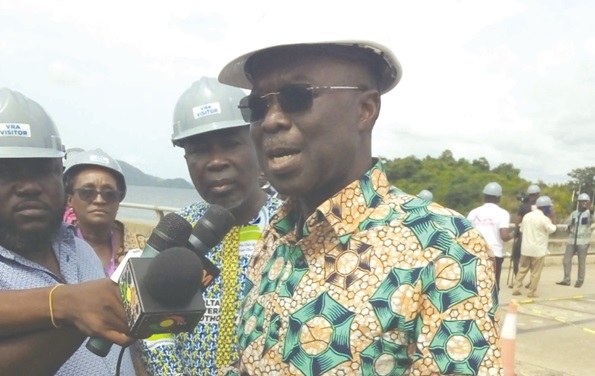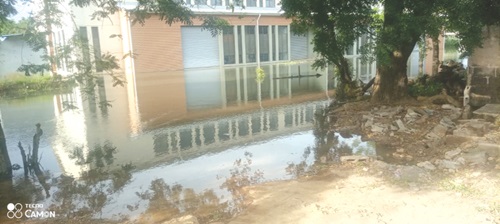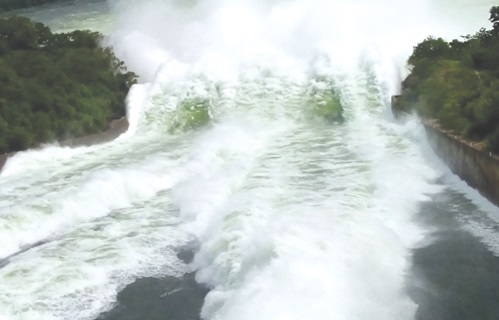
Libya’s dam collapse, Ghana's dams spillages: Lesser of two evils
The decision to release water from a dam, knowing fully well the effects on local communities and the economy is never an easy one for the management of any dam.
Advertisement
Dams are typically constructed to withstand periods of severe weather.
A dam's design and construction account for all potential repercussions but when a dam's integrity is in jeopardy, even the smallest delay or action could be the difference between a localised problem and a global catastrophe.
More than 11,000 people have been killed and tens of thousands are missing following the catastrophic failures of two dams in Libya’s Derna city in the aftermath of hurricane-strength storm Daniel on the night of September 10 and 11, 2023.
It ravaged a quarter of the city, destroying entire neighbourhoods and sweeping people out to sea.
Dam collapse
The first dam to collapse in the disaster was the Abu Mansur Dam, 13 kilometres (eight miles) from Derna, whose reservoir held 22.5 million cubic metres (nearly 800 million cubic feet) of water.
The deluge then broke Al Bilad, the second dam, which had a capacity of 1.5 million cubic metres and was just a kilometre from the coastal city.
The dams’ collapse released an estimated 30 million cubic metres (39 million cubic yards) of water, causing flooding downstream as the Wadi Derna overflowed its banks.
The floods partially destroyed the city of Derna.
The event was the second-deadliest dam failure in history, after the 1975 Banqiao Dam failure in China.

Comboni school compound
Decades of disregard for the area had been blamed for the severity of the calamity in Derna.
Libyan prosecutors and dam engineering experts have blamed the disaster on "bad management" and negligence, for which eight managers of the dam responsible for water resources and dam management stand jail terms.
Dam Spillage: Facts
The Volta River Authority (VRA) on September 15, 2023, began controlled spilling at the Akosombo and Kpong dams as a result of too much water in both reservoirs.
A rough estimate of 26,000 people, as of October 17, 2023, had been displaced as a result of the spillage.
Since the construction of the Akosombo Dam, which receives water from six separate tributaries, this is the largest magnitude of displacement and volume recorded.
The spilling was necessitated by the fact that the water level in the dams’ reservoirs had reached their safe operating level at this time of the year, thus the need to release water from the reservoirs to make room to be able to accommodate incoming flows.

Water gushing out of the spill way of the Akosombo Dam
Without overflowing, the water might topple the dam, jeopardising its structural integrity.
In May 2023, prior to the ongoing spilling, the VRA held a simulation exercise dubbed "Da Wo Ho So 2023" to test its emergency preparedness plan and to ensure that all relevant stakeholders were well prepared for any incidence of flooding.
The exercise involved over 10,000 people, including residents of communities downstream of the Akosombo Dam, government officials, and representatives of non-governmental organisations.
The simulation, which was run to test the resilience and effectiveness of the EPP, took place in the Asuogyaman, Ada East, and North Tongu districts of the Eastern, Greater Accra, and Volta regions.
Official accounts indicate that there have been no casualties such as drowning or deaths because those surrounding the banks heeded to prior warnings and complied with evacuation measures.
This is not the first time the VRA has spilled water from the dam.
Spills were carried out in the 1960s, 1970s and 1990s, with the most recent one being in 2010.
Dam failure
To disregard a heavy downpour like that in Libya meant calamity was inevitable, and that was what officials in charge of the dam's water management should have avoided.
In Ghana, the VRA had planned to carry out the spill this October, but technical observations and meteorological warnings forced the authority to do so in the middle of September. Delaying the spill for another day, according to the dam's engineers, may have been disastrous.
Dam managers, government and key stakeholders had to be directed by a dam’s design data to take measures to avoid any incident; they should also be aware of what to do in the event of a dam failure.
The VRA, managers of both the Akosombo and Kpong dams in Ghana had an Emergency Preparedness Plan (EPP) in place to deal with crises such as spills.
This plan is a thorough guide that specifies the duties that will be expected of all pertinent individuals in the case of an emergency, and it was in line with the ongoing spillage and its attendant evacuation exercises.
In the case of Libya, there was poor planning.
It was improper to build homes in the areas downstream from the dams.
In the end, if the engineers on site had released the water from the reservoir as soon as the storm started, the disaster would have been avoided, or at the very least, the damages might have been limited.
For the VRA, regular inspections on the Akosombo and Kpong dams have resulted in several retrofits over the years, the most recent in 2016.
It involved upgrading the dam's electrical and control systems, replacing the dam's turbines and generators, upgrading the dam's spillway gates, and strengthening the dam's concrete structure.
This retrofit project improved the dam's performance and extended its lifespan by 30–40 years.
In his assessment of Libya's situation, the collapse of the dams would have resulted in less damage if the gates had been opened to keep water within the dam's carrying capacity.
In Ghana's situation, however, the VRA exercised care and promptly opened the spill gates; even if the outcome is unpleasant, it could have been disastrous, considering what happened in Libya.
The writer is a technical researcher




